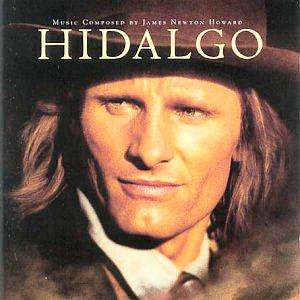************************************************************** EDITOR’s RECOMMENDATION May 2004 **************************************************************
Hidalgo
Music composed by James Newton Howard
Orchestrations by Pete Anthony, Jeff Atmajian, Brad Dechter, John Kull and James Newton Howard
Conducted by Pete Anthony & Mike Nowak
Available on Hollywood Records 274921
Running time: 45.40
Amazon UK Amazon US

See also: The Mummy and Open Range
Pardon the contradiction but Hidalgo is a middle-eastern Western, a post Indiana-Jones / The Mummy adventure about an American entering an Arabian horse-race in the 1890s. Much fuss has been made of late about how Disney tried to sell this as a true story despite the entire saga having long ago been proved to be fabrication. All of which seems to miss the point entirely, for even if the film were based on real events the on-screen action is pure Hollywood fiction; a Western crossbred with aspects of the aforementioned two franchises. And the point of my mentioning all this is to note that given this background the score by James Newton Howard sounds exactly as one might expect; classic Americana Western film music flavoured with Hollywood desert sands by way of Goldsmith's The Wind and The Lion (1976) and The Mummy (1999). Which is not to say Howard is deliberately borrowing; only that he is scoring a formula genre picture in a very definition tradition and placing his writing firmly within the expected lineage. There are no surprises here, but then nor were there any in the very predictable – if lavish and mindlessly entertaining – film, but for devotees of large scale traditional Hollywood film music there is much to enjoy. Indeed, much as the Western itself feels out of time in the 21st century, Howard's score is a throwback to decades when big films did not feel the need to offer a relentless barrage of noise, but could present a more nuanced and detailed musical landscape than is currently fashionable. There is a richness to Hidalgo which harks back to vintage Goldsmith, Williams and Bernstein (Elmer, not Leonard), to say nothing or Copland; music which rewards repeated playings and the paying of attention.
If Howard's previous score, Peter Pan, owed much to John Williams' Hook, Hidalgo equally is indebted to the joyful melodic sensibilities and rousing orchestrations of another 1992 Williams classic score: Far and Away. Add to that a dash of Magnificent Seven propulsive machismo, the lyricsm of Bruce Broughton's Tombstone (1993) and patent Goldsmith / Williams lonesome trumpet writing and transport the whole to the Arabian desert and you have something of the flavour of the current work. If that all sounds too derivative, be assured Howard brings his own character to the material and the result is frequently melodically appealing and emotionally satisfying. For instance, while the expected duduk, ney and percussion are present in the Arabesque material, rather than the now very clichéd 'ethnic wailing' as launched by Gladiator (2000), we are treated – as part of the cue 'Montage' - to a real song delivered by the immensely rich and compelling voice of Hovig Krikorian.
From evocative atmospheric passages to full blown action Hidalgo delivers, yet the score also offers a lyrical introspection besides which is all the more welcome for the general absence of such moods from modern blockbuster action movie soundtracks. A traditional score with heart and soul, and a fine companion to Michael Kamen's score for Kevin Costner's Open Range, also reviewed this month on Film Music on the Web. Incidentally, Howard scored both Costner's Westerns' Wyatt Earp (1994) and The Postman (1997), and his work for Hidalgo is far more enjoyable than his writing for either previous picture.
Gary Dalkin
4
Return to Index